In Windows 10, there are a number of system icons in the notification area on the taskbar (system tray). These icons include Volume, Network, Power, Input Indicator and Action Center. Most of them are visible by default. Here is what to do if the volume icon is missing in the system tray area.
Advertisеment
In older Windows versions, the Volume icon was hidden in the system tray if sound card drivers were not installed in the OS. This has been changed in modern Windows versions like Windows 8 and Windows 10. The icon is persistently visible in the taskbar.
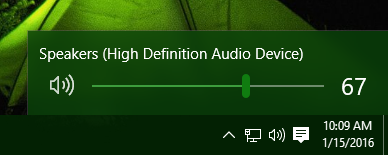
However, in a number of situations, the Volume icon can be hidden. Even when you have all the drivers installed, the icon might remain inaccessible. For many users, this is very inconvenient. With the icon, you can adjust the sound level with one click, but without it you are forced to use hotkeys (if available), the Settings app, or call the Mixer app directly. See the following article for reference:
How to Adjust App Sound Individually in Windows 10
To restore the missing icon, you can try the methods shown in this article.
Method #1
- Click the up arrow icon in the system tray on the taskbar.
- If you see the Volume icon in the flyout, simply drag and drop it to the system tray area.
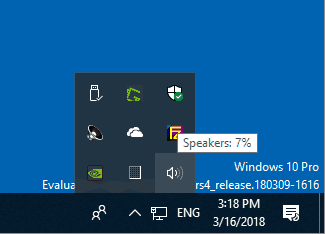
- The result will be as follows.
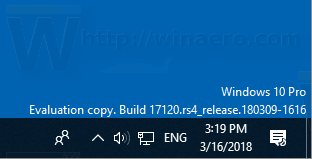
Method #2
Restart the File Explorer app
Sometimes, it is enough to just restart the Explorer.exe process to get the icon visible in the taskbar. Windows provides several secret ways to exit the Explorer shell. Refer to the following articles to learn everything about them:
- How to properly restart the Explorer shell in Windows
- Add Restart Explorer Context Menu in Windows 10
It is very easy to restart File Explorer with Task Manager.
- Open the Task Manager app.
- If it looks as follows, switch it to the full view using the "More details" link in the bottom right corner.
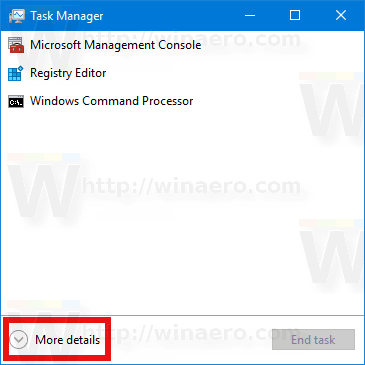
- Scroll down to the "Windows Explorer" application on the "Processes" tab. Select it.
- The "End Task" button on the bottom-right corner will turn into "Restart". Or right click "Windows Explorer", and choose Restart.
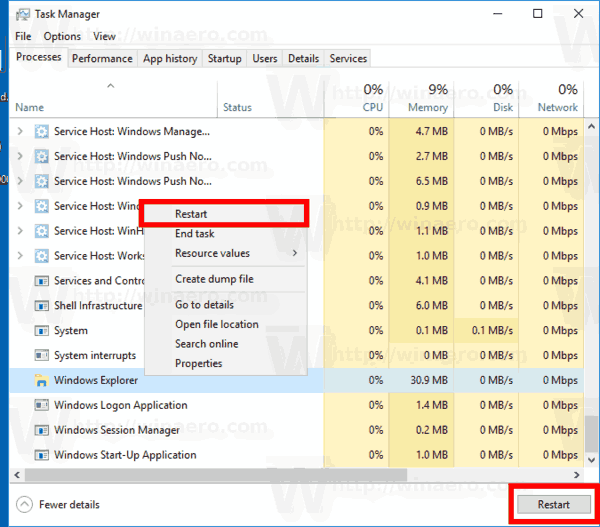
After that, see if the Volume icon appears in the system tray.
Method #3
Enable the volume icon in Settings
The volume icon can be disabled in the Settings app. Ensure that you have't disabled it there.
- Open Settings.
- Go to Personalization - Taskbar.
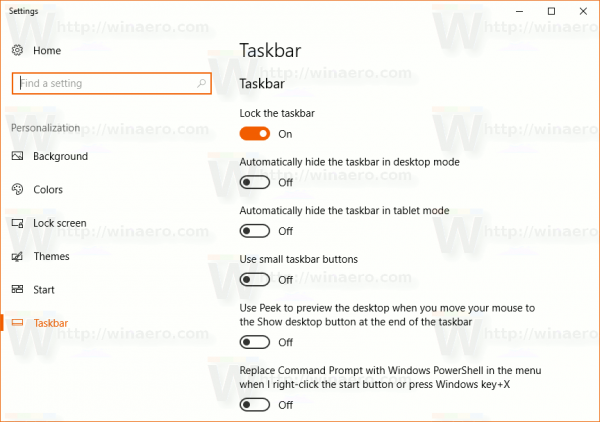
- On the right, click on the link "Turn system icons on or off" under Notification area.
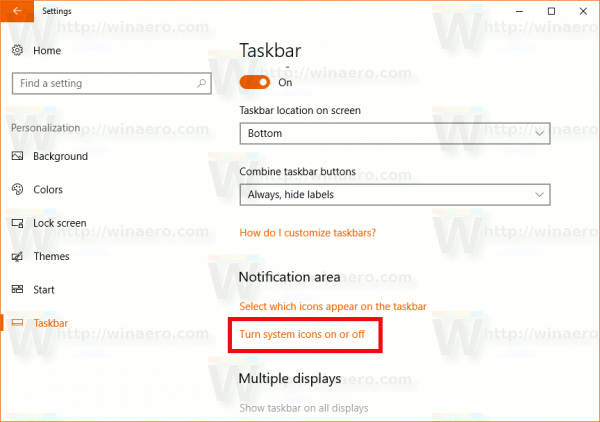
- On the next page, enable the Volume option.
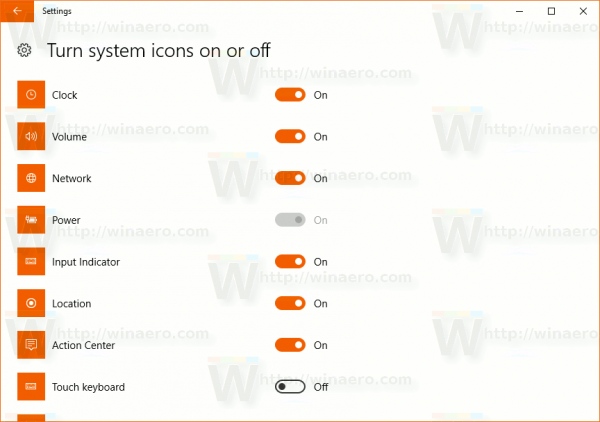
See the following articles:
If nothing helps, you can try to reset the options of the system tray area in Registry.
Method #4
Reset system tray icons in the Registry
- Press Win + R keys together on the keyboard to open the Run dialog and type the following into the Run box:
regedit
This will open the Registry Editor app for you.
- Now, press and hold Ctrl+Shift and then right click the taskbar. You will see a new item Exit Explorer. Click it.
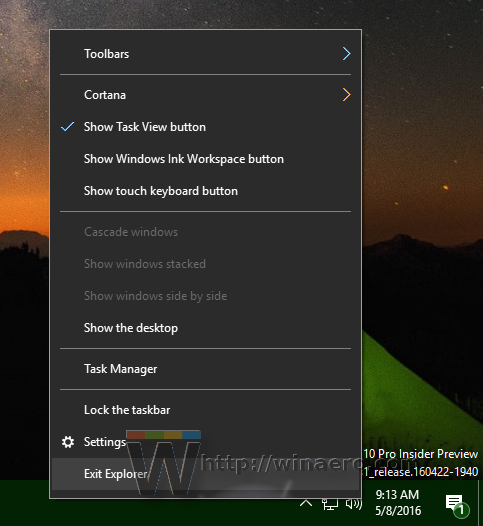 For more details about the command Exit Explorer, refer to the following article: How to properly restart the Explorer shell in Windows.
For more details about the command Exit Explorer, refer to the following article: How to properly restart the Explorer shell in Windows. - Now, return to Registry Editor.
Go to the following Registry key:HKEY_CURRENT_USER\Software\Classes\Local Settings\Software\Microsoft\Windows\CurrentVersion\TrayNotify
- In the right pane, delete the IconStreams Registry value.
- Now delete the PastIconsStream Registry value.
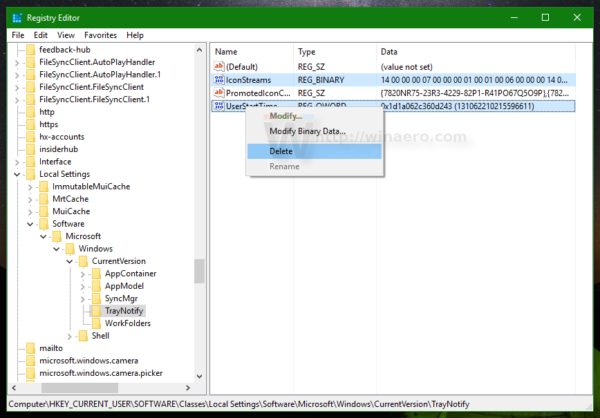
- Press Ctrl+Shift+Esc to open Task Manager. Use File -> Run new task menu item in Task Manager. Type Explorer in the "Create New Task" dialog and press Enter to restore Desktop.
Finally, you should check if the Volume icon is disabled with Group Policy.
Method #5
Check for Local Group Policy restrictions
- Open Registry Editor.
- Go to the following Registry key:
HKEY_CURRENT_USER\Software\Microsoft\Windows\CurrentVersion\Policies\Explorer
Tip: See how to jump to the desired Registry key with one click.
- On the right, look for the 32-bit DWORD value HideSCAVolume.
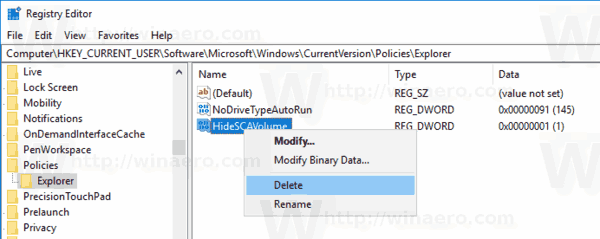
- Delete the value.
- Restart Windows 10.
Using the GUI
If you are running Windows 10 Pro, Enterprise, or Education edition, you can use the Local Group Policy Editor app to configure the options mentioned above with a GUI.
- Press Win + R keys together on your keyboard and type:
gpedit.msc
- Group Policy Editor will open. Go to User Configuration > Administrative Templates > Start menu and Taskbar.
- Set the policy option Remove the volume control to Not Configured.
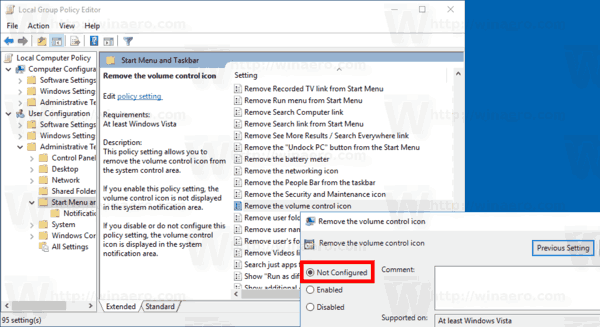
- Restart Windows 10.
That's it.
Support us
Winaero greatly relies on your support. You can help the site keep bringing you interesting and useful content and software by using these options:
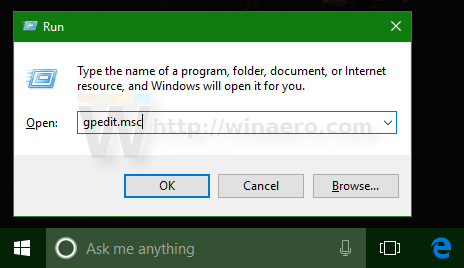

August started and after a Microsoft update, my taskbar icon went missing, first battery, and now volume. I have done all the above mention steps, the only one, I have not tried is Group Policy Editor, because I am running W10 Home edition. Any solutions, I’ve heard about third party tools to bypass the problem, but they don’t take or work at the start, and then cease to work, I would appreciate any solutions, thank you